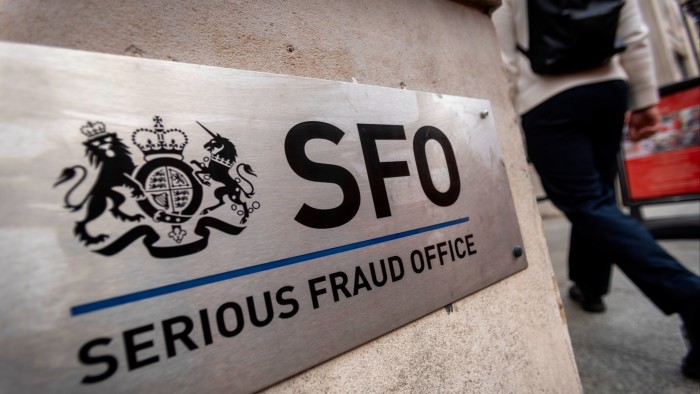Unlock the Editor’s Digest for free
Roula Khalaf, Editor of the FT, selects her favourite stories in this weekly newsletter.
The UK should break its “long-held antipathy” to paying whistleblowers in order to reduce economic crime and prevent hundreds of Britons taking information to the US, the Royal United Services Institute said.
Launching an effective whistleblower payments programme could play a “pivotal role” in reducing white-collar offences, the defence and security think-tank found, adding weight to calls from the Serious Fraud Office for the UK to consider such a scheme.
“Having an insider who can provide the emails and can provide the evidence just changes the game,” Eliza Lockhart, from Rusi, told the Financial Times.
“But it means that you need to get over the idea that a whistleblower is going to be this kind of moralistic hero that we put on a pedestal,” she added.
The UK’s financial regulators looked at paying for information a decade ago in the wake of the 2008 financial crisis, but concluded such a scheme was unnecessary.
Tips from the UK make up one of the biggest sources of intelligence from outside America for the US Securities and Exchange Commission, which has been paying informants since 2011. Last year, the US markets watchdog awarded $279mn to a whistleblower, its largest-ever payout.
Still, only 0.5 per cent of whistleblowers contacting the SEC have received a financial reward, counter to the perception that it is common for people to receive millions of dollars from these schemes, Lockhart said.
The Rusi study, which was funded by the Serious Organised Crime and Anti-Corruption Evidence research programme, looked at schemes in the US and Canada, and concluded that a formal programme also offered better protections to handle such information, which was a key reason why informants used them.
“The money is important, but the protection, the idea that you are actually actively going to be protected, is what anecdotally from the US appears to be one of the major driving factors,” said Lockhart.
It said that an Office of the Whistleblower to co-ordinate payment schemes would be vital to the success of a programme. This body could also focus on the quality of the information being provided over the motivations for a person to report, Rusi said.
While it is possible the programme would breed a cottage industry of lawyers pursuing these cases, the research found that the US had actually benefited from a system that prevents people from facing upfront fees, making it more likely they come forward.
SFO director Nick Ephgrave, who has publicly backed a scheme, said: “I would like to see the UK move to a model where financial incentives are available to encourage whistleblowers to come forward.”
He added: “Since 2012 there has been an increasing trend by UK whistleblowers towards engaging with US law enforcement, where there exist several effective incentivisation schemes. A change in the UK system would see these individuals report to UK authorities, leading to increased detection and prosecution of economic crime here.”
There are already some whistleblower payment schemes in the UK. The Competition and Markets Authority offers a reward of up to £250,000 for information on illegal cartels — raised from £100,000 last year — while HM Revenue & Customs can also pay whistleblowers.
Financial Conduct Authority boss Nikhil Rathi said it would be “highly countercultural” for the UK to go as far as the US in paying large sums for information, but that he was “not in principle opposed to” the idea of remunerating people who come forward.
“We rely on whistleblowers as a vital source of evidence for all of our work, particularly supervisory and enforcement work, and we do want to make sure we continue to focus on how we can build confidence in the whistleblowing infrastructure here in the UK,” Rathi told the FT.
However, last month the watchdog was criticised for its “alarming” treatment of internal and external whistleblowers in a damning report released by parliamentarians.
Earlier this year, FCA chair Ashley Alder was also found to have broken its own rules after sharing internally the identities of two former employees who had blown the whistle.



